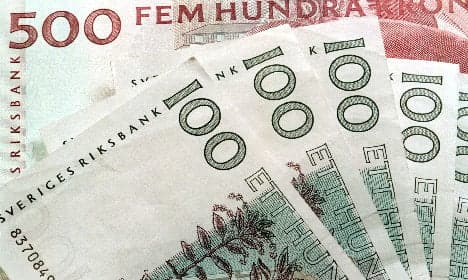Sweden cuts key interest rate to new record low

UPDATED: Sweden's central bank (the Riksbank) has slashed its key interest rate, the repo, to new record negative levels just over a month after it announced a similar move.
"The Executive Board of the Riksbank has decided to make monetary policy even more expansionary by cutting the repo rate by 0.15 percentage points to -0.25 percent and buying government bonds for 30 billion kronor, to support the upturn in inflation," the central bank said in a statement on Wednesday.
Riksbank chiefs said that recent appreciation of the krona risks breaking a positive trend of rising inflation and added that the central bank had therefore decided to make monetary policy even more expansionary by cutting the repo rate yet again.
"This is surprising," Torbjörn Isaksson, macro economist at Swedish banking giant Nordea, told news wire TT.
"But the Riksbank has decided to keep the krona weak and does not settle for the rise in inflation we have had," he added.
The unexpected decision, which will apply from March 25th, follows the bank's move on February 11th to cut the repo to -0.1 percent, the first time in history there had been a negative interest rate in Sweden.
The central bank added in Wednesday's statement: "The repo rate is expected to remain at -0.25 percent at least until the second half of 2016. After that, it is expected to rise gradually."
Negative rates work differently to positive interest ones when borrowers pay money lenders an interest rate, usually an annual percentage on the total amount of money borrowed. Meanwhile savers putting money into a bank can normally expect to earn interest on that cash.
When interest rates are negative, this relationship is reversed, so lenders - i.e. banks - have to pay to lend money or to make an investment.
The basic idea behind negative rates is to stop organisations or people from making risky investments or transactions that could impact on the wider economy.
The surprise decision could put increased pressure on a property market already under strain, Tor Borg, chief economist at Swedish mortgage firm SBAB, told TT.
"It remains to be seen how the market reacts, but I don't think it will have a great effect on property interest rates. Partly because it is still a small decrease, partly because property interests are already at very low levels."
"[But property prices] could end up going up some more, even though their interest rate is not affected. There is already a lof of activity on the property market, but there could be a psychological effect that causes the prices to rise even more," he said.
Wednesday afternoon's move came just hours after a new survey showed that Swedes were feeling more optimistic about their personal finances, although their confidence had yet to translate into increased consumption.
"It appears that the interest weapon which was supposed to get the ball rolling and increase consumption has not worked. We see that families prioritize savings and investment," Jeanette Hauff, Skandia behavioural economist, told Swedish news agency TT.
In February the krona hit its weakest level since the financial crisis. It has since recuperated slightly, with 9.1706 kronor required to buy a euro on Wednesday, compared to 9.6835 kronor a month ago.
Comments
See Also
"The Executive Board of the Riksbank has decided to make monetary policy even more expansionary by cutting the repo rate by 0.15 percentage points to -0.25 percent and buying government bonds for 30 billion kronor, to support the upturn in inflation," the central bank said in a statement on Wednesday.
Riksbank chiefs said that recent appreciation of the krona risks breaking a positive trend of rising inflation and added that the central bank had therefore decided to make monetary policy even more expansionary by cutting the repo rate yet again.
"This is surprising," Torbjörn Isaksson, macro economist at Swedish banking giant Nordea, told news wire TT.
"But the Riksbank has decided to keep the krona weak and does not settle for the rise in inflation we have had," he added.
The unexpected decision, which will apply from March 25th, follows the bank's move on February 11th to cut the repo to -0.1 percent, the first time in history there had been a negative interest rate in Sweden.
The central bank added in Wednesday's statement: "The repo rate is expected to remain at -0.25 percent at least until the second half of 2016. After that, it is expected to rise gradually."
Join the conversation in our comments section below. Share your own views and experience and if you have a question or suggestion for our journalists then email us at [email protected].
Please keep comments civil, constructive and on topic – and make sure to read our terms of use before getting involved.
Please log in here to leave a comment.